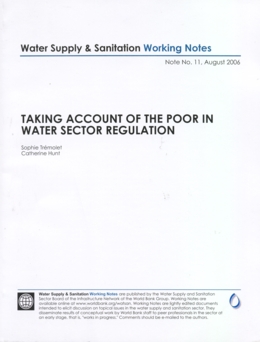|
 This note seeks to assist policy makers and regulators in identifying what they can do to modify the existing regulatory framework or to implement it in a way that is particularly favorable to poor customers. It addresses the following questions: The guidance provided in this note sets out how the needs of poor customers can be taken into account in the regulatory process and framework. It could be of use to policy makers, regulators, service providers, donors, or consumers and their representatives to identify what should be done and decide the way to lift regulatory constraints that have been identified. Many of the actions and regulatory measures recommended here do not need to be labeled as pro-poor in order to achieve the expected benefits. In fact, in certain circumstances, labeling measures in such a way may actually reduce the buy-in from poor customers who would not want to be "put in a box" or labeled in such a way. They would be simple be measures taht acknowledge the true nature of the market for water services in many developing countries, which is a much more eclectic and fragmented market than in developed countries. DEfining such programs of measures to take account of the poor in water sector regulation will require political will and initiative. Donors may have a substantial role to play in advocating and supporting such approaches. Table of Contents: 1. Introduction 2. Taking Account of the Poor: rationale and Principles 3. Taking Account of the Poor: Practical Applications Annexes:
Post Date : 04 Juni 2009 |